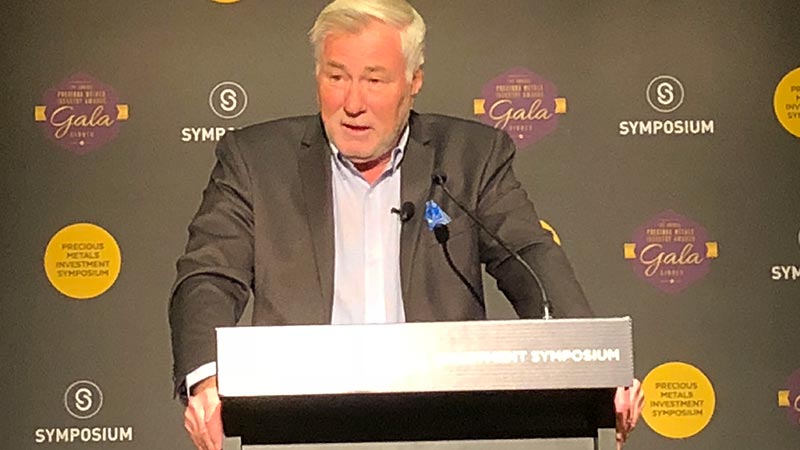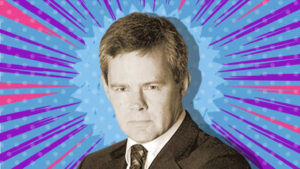‘No friggin’ idea’: billionaire investor Eric Sprott doesn’t hold back on gold forecasters

Pic: Tyler Stableford / Stone via Getty Images
Eric Sprott knows just a bit about how to make money in mining, so when the Canadian billionaire investor gets up to address a crowd people listen.
It was no different when Mr Sprott took the stage on the second day of the Precious Metals Investment in Symposium in Perth to provide his thoughts on the gold space.
The 73-year-old — described by Bloomberg as “one of the world’s premiere gold and silver investors” — kicked off an hour-long presentation by expressing his disgust at the underwhelming forecasts for gold.
“These guys that make these forecasts have no friggin’ idea okay — and why do I say that?
“I say that because I have been doing this for 20 years and when I got involved in 2000 when [gold] was just around $US260 odd dollars, what was everyone’s forecast? 1 per cent, 2 per cent.
“And of course, the price between 2000 and 2011 went up by 750 per cent.”
Even the World Gold Council is too conservative with its forecasts, according to Mr Sprott.
“I watch China consume massive amounts of gold. I saw India this year double their silver imports,” he said.
“Suddenly they went from 15 per cent of the world’s silver to 30 per cent of the world’s silver and yet somebody is going to tell me that silver demand is going to go up 1 per cent this year?
“They bought 15 per cent of the god dam production that they didn’t buy the year before.”

Mr Sprott also pointed to how much silver is traded each day.
“Silver trades 500 million ounces a day, we mine about 860 [million ounces each year],” he explained.
“We’re trading 60 per cent of the world’s yearly production every day. Why do we trade that much when everyone hates it anyway?”
Mr Sprott did, however, concede that gold has had a bit of a bad time since 2011.
“Every time you read something, something fatalistic is going to happen to gold and silver,” he said.
“Not that it hasn’t by the way for the last six years okay, it has. Ever since 2011 it has been kind of a tough road. There are good times and there are bad times in the gold business.”
But things are looking up.
“We have an interesting situation in the gold market today, silver market as well, where all the commercials have kind of turned around and gotten out of their short position and the speculative traders are the guys who are shorting,” he said.
“Typically, that means the prices go up because the banks always make money, they have always got more money and power than a few guys who are speculating on something.
- Subscribe to our daily newsletter
- Bookmark this link forsmall cap news
- Join our small cap Facebook group
- Follow us on Facebook or Twitter
“Now it hasn’t happened yet, but we see signs of it. It’s slowly been quite strong. It looks like there might be a bottoming here. We’ve definitely had a long-term bottoming.”
Mr Sprott says this is largely because countries like Poland and India have started buying gold again after a long hiatus, and central banks are spruiking the precious metal.
“I’ve seen central bankers speak out in favour of gold,” he said.
“And of course, the Russians buy gold all the time because they hate the US currency. You have China, Russia, Iran, Turkey … working against US dollar hegemony.
“I think that the world’s view of the US dollar will continue to deteriorate.”
Palladium is looking mighty fine
Although not one of Mr Sprott’s fortes, palladium also made it into the conversation.
He noted how well the price of the platinum group metal is doing at the moment.
The largest use of palladium is in catalytic converters. It is also used in jewellery, dentistry, aircraft spark plugs, surgical instruments and electrical contacts.
“Palladium has been hitting a new all-time high,” Mr Sprott said.
“I’m not a palladium guy but some people suggest there’s a physical shortage of palladium.
“I would love nothing more than there to be a physical shortage of any precious metal, so that then we’ll start thinking about what’s going on in the precious metals business and why does the commodity exchange – a place where paper products are traded – determine the price of the physical product?”
Crypto is gold’s arch nemesis
While many people are excited by cryptocurrency, Mr Sprott sees it more as a threat to gold than a good investment.
“I’ll be honest, whenever I look at Kitco in the morning I kind of hope that the crypto values have gone down because they’ve hurt gold a lot,” he said.
“A lot of people that might have otherwise gone to gold have gone to cryptos.”
Miners in Canada also have to compete with cannabis players for capital, which is another point of contention for Mr Sprott.
“We have cannabis stocks that trade at $C20 billion,” he said
“That’s about the value of all the junior gold stocks in Canada and a year ago they traded at zero.
“So these are competing things right. If you can go and make thousands of per cent in the cannabis stock who needs a gold stock? It’s been very difficult as a group for the gold stocks to do well.”
UNLOCK INSIGHTS
Discover the untold stories of emerging ASX stocks.
Daily news and expert analysis, it's free to subscribe.
By proceeding, you confirm you understand that we handle personal information in accordance with our Privacy Policy.








